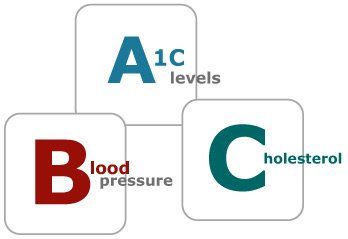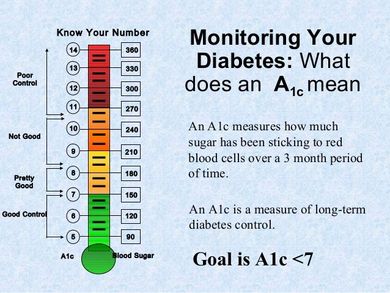E D U C A T I O N
TESTS
T E S T S
Learning About Tests When You Have Diabetes
What tests do you need?
The tests you may have, how often you should have them, and the goals of the tests are:
Follow-up Care
Follow-up care is a key part of your treatment and safety. Be sure to make and go to all appointments, and call your doctor if you are having problems. It's also a good idea to know your test results and keep a list of the medicines you take.
LEARN MORE
Care instructions adapted under license by Alliance In Health Diabetes Control Center. This care instruction is for use with your licensed healthcare professional. If you have questions about a medical condition or this instruction, always ask your healthcare professional. Healthwise, Incorporated disclaims any warranty or liability for your use of this information.
A 1 C T E S T
Hemoglobin A1c: About This Test
What is it?
Hemoglobin A1c is a blood test that checks your average blood sugar level over the past 2 to 3 months. This test also is called a glycohemoglobin test or an A1c test.
Why is this test done?
The A1c test is done to check how well your diabetes has been controlled over the past 2 to 3 months. Your doctor can use this information to adjust your medicine and diabetes treatment, if needed.
How can you prepare for the test?
You do not need to stop eating before you have an A1c test. This test can be done at any time during the day, even after a meal.
What happens during the test?
The health professional taking a sample of your blood will:
- Wrap an elastic band around your upper arm. This makes the veins below the band larger so it is easier to put a needle into the vein.
- Clean the needle site with alcohol.
- Put the needle into the vein.
- Attach a tube to the needle to fill it with blood.
- Remove the band from your arm when enough blood is collected.
- Put a gauze pad or cotton ball over the needle site as the needle is removed.
- Put pressure on the site and then put on a bandage.
What else should you know about the test?
The test result is usually given as a percentage. The normal A1c is less than 5.7%.
LEARN MORE
The A1c test result also can be used to find your estimated average glucose, or eAG. Your eAG and A1c show the same thing in two different ways. They both help you learn more about your average blood sugar range over the past 2 to 3 months.
Care instructions adapted under license by Alliance In Health Diabetes Control Center. This care instruction is for use with your licensed healthcare professional. If you have questions about a medical condition or this instruction, always ask your healthcare professional. Healthwise, Incorporated disclaims any warranty or liability for your use of this information.




